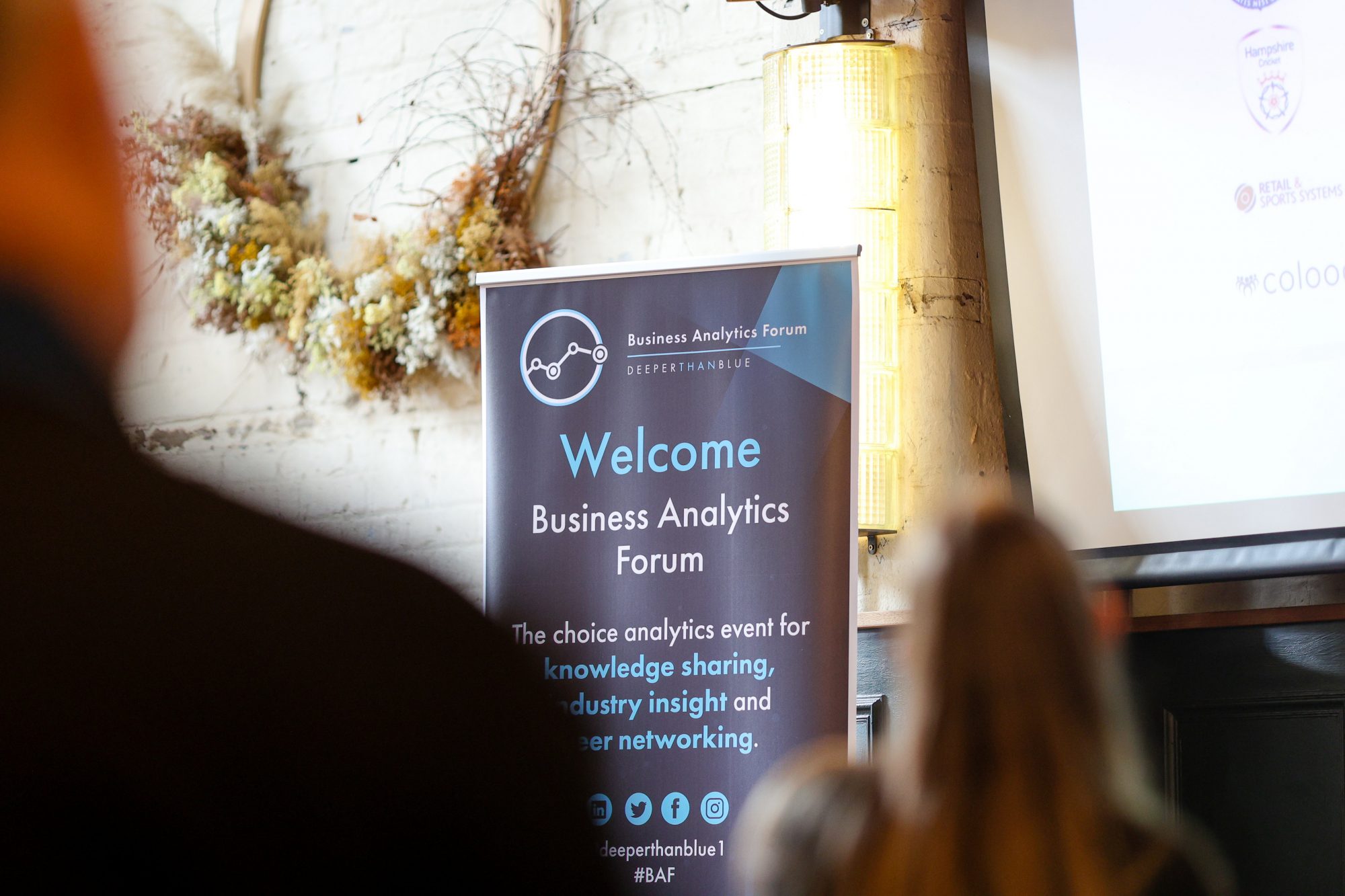 Sophie Nadin
| 19 October 2021 |
Sophie Nadin
| 19 October 2021 |
10 things we learned at the Business Analytics Forum

The Business Analytics Forum is back, and in the flesh too. Wednesday 13th October saw the forum’s in-person return at the Mowbray in Sheffield. We welcomed a range of speakers from across our business and our wider network to discuss all things analytics. Here are 10 key insights we learned from the event:
-
It’s great to be back
Yes, BAF has been running as a purely online event over the last 18 months, but there’s nothing like getting back to in-person networking. We welcomed Bernie Smith, Simon Harrison, Chris Jackson, Matthew Robinson, Julian Shaw and Sherin Mathew to the stage, with each speaker commenting on just how fantastic it was to be back again. We couldn’t agree more, and we know it’s a sentiment shared by all our attendees too.
So, what did we learn?
-
Get your fundamentals in place
Whether you’re looking to scale your business or make the most of AI, it’s so important to get your fundamentals in place. Setting targets and incentives that work, choosing the best possible software and most importantly putting the right strategy in place will all play their part. A key take away from the day, echoed by all our speakers, was don’t run before you can walk – for example, you can’t put AI on bad data.
-
When it comes to planning, Excel can only get you so far
It’s difficult to ignore Excel. Everyone is familiar with it and is used to working with it – we all know how difficult it is to shift finance teams from their Excel safe space. And whilst it is easy to use and flexible, it relies on manual processes and creates analytical silos with multiple versions of “the truth” across various departments of the business. It’s also difficult to maintain and not secure. So, what happens when it breaks? You need a solution that works for your business.
 IBM’s Matthew Robinson (pictured left) talked us through the capabilities of IBM Planning Analytics with Watson, specifically how the planning software plays on the familiarity of Excel whilst removing its inherent problems. By offering integrated planning across an organisation it enables organisational strategy alignment and collaborative business decision-making which in turn leads to better results. And whilst users have a dedicated planning and analytics workspace or dashboard, the Excel integration keeps things simple, familiar and efficient. Put simply, IBM Planning Analytics with Watson brings essential agility right across your business.
IBM’s Matthew Robinson (pictured left) talked us through the capabilities of IBM Planning Analytics with Watson, specifically how the planning software plays on the familiarity of Excel whilst removing its inherent problems. By offering integrated planning across an organisation it enables organisational strategy alignment and collaborative business decision-making which in turn leads to better results. And whilst users have a dedicated planning and analytics workspace or dashboard, the Excel integration keeps things simple, familiar and efficient. Put simply, IBM Planning Analytics with Watson brings essential agility right across your business.
-
It’s all about real-time reporting when it comes to data
 With the flexibility and scalability on offer from platforms such as Snowflake, businesses of all sizes can accelerate analytics in the cloud, and crucially benefit from accurate real-time reporting.
With the flexibility and scalability on offer from platforms such as Snowflake, businesses of all sizes can accelerate analytics in the cloud, and crucially benefit from accurate real-time reporting.
Chris Jackson (pictured right) was on hand to detail the potential of Snowflake when it comes to solving the many challenges businesses are facing today. From continuously ingested data that’s available in minutes to the lack of worry around infrastructure and software installation, to the enhanced security benefits on offer.
-
Yet software alone is not a solution
Simply putting new software in place won’t automatically convert your organisation into an analytics and data-driven business. It’s just one step.
You need to understand what’s possible – getting the best insights from your data is key to this. But you also need to apply proper controls to your planning and analytics, as well as building the right team to act on those insights and make business-focused decisions. A key point, well made by DeeperThanBlue’s Simon Harrison (pictured below left).
-
Ensuring your data projects become a success
 Post-COVID, it’s clear that organisations are recognising that they need to do more with data. Take the example of workforce planning when it comes to hybrid vs. remote working – a key issue faced by businesses across the world today. But how do you make sure you’re using your data in the right way and getting the most out of it?
Post-COVID, it’s clear that organisations are recognising that they need to do more with data. Take the example of workforce planning when it comes to hybrid vs. remote working – a key issue faced by businesses across the world today. But how do you make sure you’re using your data in the right way and getting the most out of it?
External assistance is often essential. And that’s exactly what Simon Harrison detailed when it came to our Analytics Health Check. By implementing a thorough review of people, processes and technologies in your business, and identifying areas of excellence and areas of weakness, you can begin to understand the essential steps to make sure your data projects are destined for success.
Simon also detailed how this exact process enabled Rewards4 to become more data-driven, connect with their customers and scale their business at the right time.
-
Setting effective targets and incentives will help you understand where you want to get to
 So, how do you measure your business performance? Founder of Made to Measure KPIs Bernie Smith (pictured left) ran through the importance of setting effective targets and incentives that work. Detailing his end-to-end process, Bernie noted a key factor often missed by many businesses. White hat and black hat testing.
So, how do you measure your business performance? Founder of Made to Measure KPIs Bernie Smith (pictured left) ran through the importance of setting effective targets and incentives that work. Detailing his end-to-end process, Bernie noted a key factor often missed by many businesses. White hat and black hat testing.
And when it comes to black hat testing it’s all about breaking your targets and incentives. Ask yourself “how can you hit your targets in the worst possible way?” and by getting the best brains in a room together you’ll see that the best people come up with ingenious ideas. And if they can be broken? It’s back to the start of the process.
-
It’s not just about your business, the wider instability felt across various industries and sectors can impact your data
 Retail is struggling due to supply chain issues caused by the contraction of the pandemic to the opening up of markets. The question is, how do you forecast when this unprecedented 18 months has drastically changed your earnings and figures?
Retail is struggling due to supply chain issues caused by the contraction of the pandemic to the opening up of markets. The question is, how do you forecast when this unprecedented 18 months has drastically changed your earnings and figures?
DeeperThanBlue’s Julian Shaw (pictured left) detailed the possibilities of our Retail Performance Management Solution. By automating planning, budgeting and forecasting it offers essential line of sight across a business, with all data able to be accessed with integrated financial results and analysis for faster execution. Crucially, it caters for anomalies across a business and excludes them from the wider data analysis (whether geographical anomalies or those caused by global events) providing accurate forecasting without wasting more time by reforecasting.
-
Leadership is the most important AI ingredient
More and more businesses are continuing to investigate the possibilities of what AI can mean for them. We’ve seen the power of AI when it comes to connecting with customers for brands like Netflix, but how can this become a reality for other organisations?
Sherin Mathew (pictured below right) detailed how to deliver a successful AI strategy, and according to Sherin, leadership is the most important AI ingredient. Leadership in this instance amounts to defining the AI vision for the business, detailing the strategy, investing in processes and driving cultural change across the organisation. Without effective leadership, even the best technology solutions will fail.
-
The ethics of AI is yet to be fully established
 One of the key insights provided by Sherin was the need for AI to be ethical. Central to this is the right to intelligence – say you build AI-powered driverless taxis based on intelligence gained from taxi drivers, who has the right to this intelligence? The taxi drivers themselves or the creators of the new technology?
One of the key insights provided by Sherin was the need for AI to be ethical. Central to this is the right to intelligence – say you build AI-powered driverless taxis based on intelligence gained from taxi drivers, who has the right to this intelligence? The taxi drivers themselves or the creators of the new technology?
AI should also be purpose-driven, whilst factors such as the potential disruption to people’s lives and the possible risk should be reevaluated and factored into an accountable redesign. With the current lack of GDPR-like regulations in the area of AI, this is just the start for AI and ethics.
We’ll be posting more useful insights from BAF in the coming weeks and will also be announcing the next in-person event soon. In the meantime, get in touch with us at DeeperThanBlue for more information about Retail Performance Management and our Analytics Health Check.
Related Content
AI For Business – Let’s get on with it…
AI is here to stay. You’re already using it whether you like it or not. So how do you useFind out more
The future of analytics: 5 key areas to look to for change
So, where will we be in the next five, 10 or 15 years? What will become reality and what willFind out more

